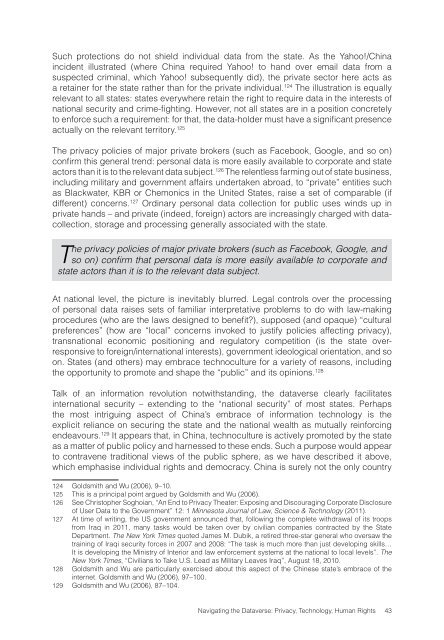Navigating the Dataverse: Privacy, Technology ... - The ICHRP
Navigating the Dataverse: Privacy, Technology ... - The ICHRP
Navigating the Dataverse: Privacy, Technology ... - The ICHRP
Create successful ePaper yourself
Turn your PDF publications into a flip-book with our unique Google optimized e-Paper software.
Such protections do not shield individual data from <strong>the</strong> state. As <strong>the</strong> Yahoo!/China<br />
incident illustrated (where China required Yahoo! to hand over email data from a<br />
suspected criminal, which Yahoo! subsequently did), <strong>the</strong> private sector here acts as<br />
a retainer for <strong>the</strong> state ra<strong>the</strong>r than for <strong>the</strong> private individual. 124 <strong>The</strong> illustration is equally<br />
relevant to all states: states everywhere retain <strong>the</strong> right to require data in <strong>the</strong> interests of<br />
national security and crime-fighting. However, not all states are in a position concretely<br />
to enforce such a requirement: for that, <strong>the</strong> data-holder must have a significant presence<br />
actually on <strong>the</strong> relevant territory. 125<br />
<strong>The</strong> privacy policies of major private brokers (such as Facebook, Google, and so on)<br />
confirm this general trend: personal data is more easily available to corporate and state<br />
actors than it is to <strong>the</strong> relevant data subject. 126 <strong>The</strong> relentless farming out of state business,<br />
including military and government affairs undertaken abroad, to “private” entities such<br />
as Blackwater, KBR or Chemonics in <strong>the</strong> United States, raise a set of comparable (if<br />
different) concerns. 127 Ordinary personal data collection for public uses winds up in<br />
private hands – and private (indeed, foreign) actors are increasingly charged with datacollection,<br />
storage and processing generally associated with <strong>the</strong> state.<br />
<strong>The</strong> privacy policies of major private brokers (such as Facebook, Google, and<br />
so on) confirm that personal data is more easily available to corporate and<br />
state actors than it is to <strong>the</strong> relevant data subject.<br />
At national level, <strong>the</strong> picture is inevitably blurred. Legal controls over <strong>the</strong> processing<br />
of personal data raises sets of familiar interpretative problems to do with law-making<br />
procedures (who are <strong>the</strong> laws designed to benefit?), supposed (and opaque) “cultural<br />
preferences” (how are “local” concerns invoked to justify policies affecting privacy),<br />
transnational economic positioning and regulatory competition (is <strong>the</strong> state overresponsive<br />
to foreign/international interests), government ideological orientation, and so<br />
on. States (and o<strong>the</strong>rs) may embrace technoculture for a variety of reasons, including<br />
<strong>the</strong> opportunity to promote and shape <strong>the</strong> “public” and its opinions. 128<br />
Talk of an information revolution notwithstanding, <strong>the</strong> dataverse clearly facilitates<br />
international security – extending to <strong>the</strong> “national security” of most states. Perhaps<br />
<strong>the</strong> most intriguing aspect of China’s embrace of information technology is <strong>the</strong><br />
explicit reliance on securing <strong>the</strong> state and <strong>the</strong> national wealth as mutually reinforcing<br />
endeavours. 129 It appears that, in China, technoculture is actively promoted by <strong>the</strong> state<br />
as a matter of public policy and harnessed to <strong>the</strong>se ends. Such a purpose would appear<br />
to contravene traditional views of <strong>the</strong> public sphere, as we have described it above,<br />
which emphasise individual rights and democracy. China is surely not <strong>the</strong> only country<br />
124 Goldsmith and Wu (2006), 9–10.<br />
125 This is a principal point argued by Goldsmith and Wu (2006).<br />
126 See Christopher Soghoian, “An End to <strong>Privacy</strong> <strong>The</strong>ater: Exposing and Discouraging Corporate Disclosure<br />
of User Data to <strong>the</strong> Government” 12: 1 Minnesota Journal of Law, Science & <strong>Technology</strong> (2011).<br />
127 At time of writing, <strong>the</strong> US government announced that, following <strong>the</strong> complete withdrawal of its troops<br />
from Iraq in 2011, many tasks would be taken over by civilian companies contracted by <strong>the</strong> State<br />
Department. <strong>The</strong> New York Times quoted James M. Dubik, a retired three-star general who oversaw <strong>the</strong><br />
training of Iraqi security forces in 2007 and 2008: “<strong>The</strong> task is much more than just developing skills…<br />
It is developing <strong>the</strong> Ministry of Interior and law enforcement systems at <strong>the</strong> national to local levels”. <strong>The</strong><br />
New York Times, “Civilians to Take U.S. Lead as Military Leaves Iraq”, August 18, 2010.<br />
128 Goldsmith and Wu are particularly exercised about this aspect of <strong>the</strong> Chinese state’s embrace of <strong>the</strong><br />
internet. Goldsmith and Wu (2006), 97–100.<br />
129 Goldsmith and Wu (2006), 87–104.<br />
<strong>Navigating</strong> <strong>the</strong> <strong>Dataverse</strong>: <strong>Privacy</strong>, <strong>Technology</strong>, Human Rights 43
















